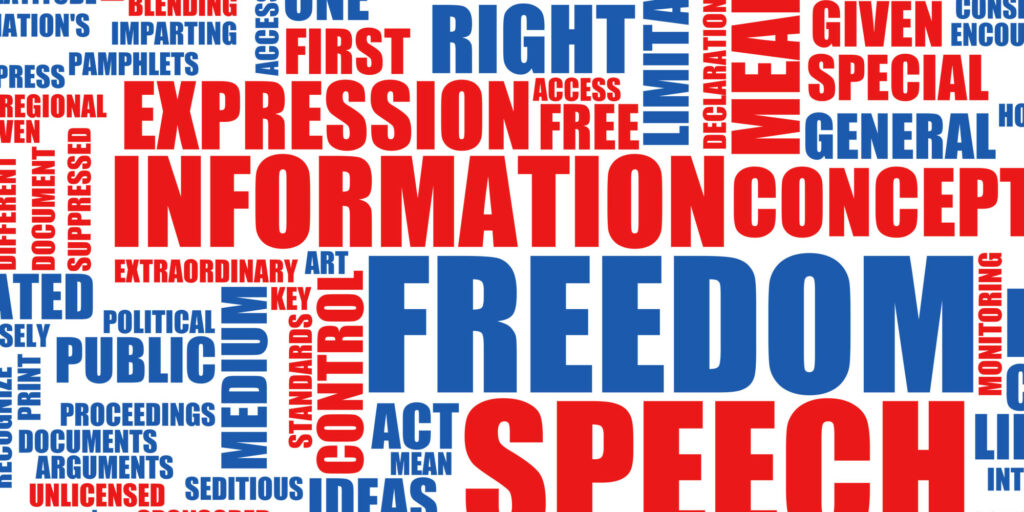Free speech is a fundamental right that is enshrined in the constitutions of many democratic countries, including the United States. It is a cornerstone of a free and democratic society, as it allows individuals to express their opinions, ideas, and beliefs without fear of censorship, retribution, or punishment from the government or other authorities. However, the concept of free speech is often misunderstood, misinterpreted, and misapplied, leading to conflicts, controversies, and confusion.
At its core, free speech means the freedom to express oneself, whether through speech, writing, art, or other forms of communication, without interference or suppression from the government or other entities. Free speech includes not only the right to express popular or mainstream views but also the right to express dissenting or controversial views, which are often the most important and valuable forms of speech. Without the ability to express dissenting or controversial views, societies risk becoming stagnant, closed-minded, and intolerant.
However, free speech does not mean the freedom to say anything, anywhere, at any time, without consequences. There are limits to free speech, such as when it incites violence or hatred, promotes discrimination, or violates the rights of others. These limits are necessary to prevent harm to individuals or society as a whole and to ensure that free speech is used responsibly and ethically.
Free speech is also not an absolute right, as it may conflict with other important values, such as privacy, security, and public safety. For example, the government may restrict certain types of speech, such as hate speech or obscenity, in order to protect vulnerable groups or maintain public order. Similarly, private entities, such as social media platforms, may enforce their own rules and policies regarding speech in order to maintain civility and decorum on their platforms.
The concept of free speech has evolved over time, as societies have grappled with the challenges of balancing the right to free expression with other important values and interests. In the United States, the First Amendment to the Constitution guarantees the right to free speech, but the Supreme Court has interpreted this right in various ways over the years, depending on the context and circumstances.
For example, the Court has ruled that some forms of speech, such as commercial speech, are subject to greater regulation than other forms of speech, such as political speech. It has also recognized that certain types of speech, such as obscenity or fighting words, are not protected by the First Amendment, as they do not contribute to the marketplace of ideas and may cause harm or offense.
In addition, the Court has established various tests and standards to determine whether certain types of speech are protected by the First Amendment. These tests include the “clear and present danger” test, which allows the government to restrict speech that poses a clear and present danger of imminent harm, and the “strict scrutiny” test, which requires the government to show a compelling interest in restricting speech that is based on a particular viewpoint or content.
The concept of free speech also extends beyond the legal realm and encompasses broader societal norms and values. In a free and democratic society, individuals should be able to express their views and opinions without fear of social ostracism, intimidation, or retaliation. This requires a culture of tolerance, openness, and respect for diversity, where individuals are free to engage in reasoned debate and exchange of ideas, and where dissent and disagreement are seen as valuable contributions to the marketplace of ideas.
However, this ideal of free speech is often challenged by various forces, such as political polarization, misinformation, hate speech, and online harassment. These forces can undermine the quality of public discourse and create a chilling effect on free expression, especially for marginalized or minority groups.
To address these challenges, individuals, communities, and governments need to work together to promote a culture of free speech that respects human dignity, encourages critical thinking and constructive dialogue, and fosters a sense of responsibility and accountability. This requires a multi-faceted approach that involves education, media literacy, civic engagement, and legal and policy reforms.
For example, schools and universities can play a crucial role in educating students about the value and limits of free speech and promoting a culture of intellectual curiosity and civil discourse. Media organizations can promote responsible journalism and fact-checking, and provide diverse perspectives and voices. Civil society groups can advocate for the protection of free speech and the rights of marginalized groups, and monitor and expose cases of censorship or repression. Governments can enact laws and policies that balance the right to free speech with other important values, such as privacy, security, and public safety, and ensure that these laws and policies are transparent, accountable, and subject to democratic oversight.
In conclusion, free speech is a complex and nuanced concept that is essential for the functioning of a free and democratic society. It encompasses the freedom to express oneself without interference or suppression from the government or other entities but also recognizes the limits and responsibilities that come with this freedom. To uphold and strengthen free speech in today’s rapidly changing world, we need to promote a culture of tolerance, openness, and respect for diversity, and work together to address the challenges and opportunities of the digital age.

